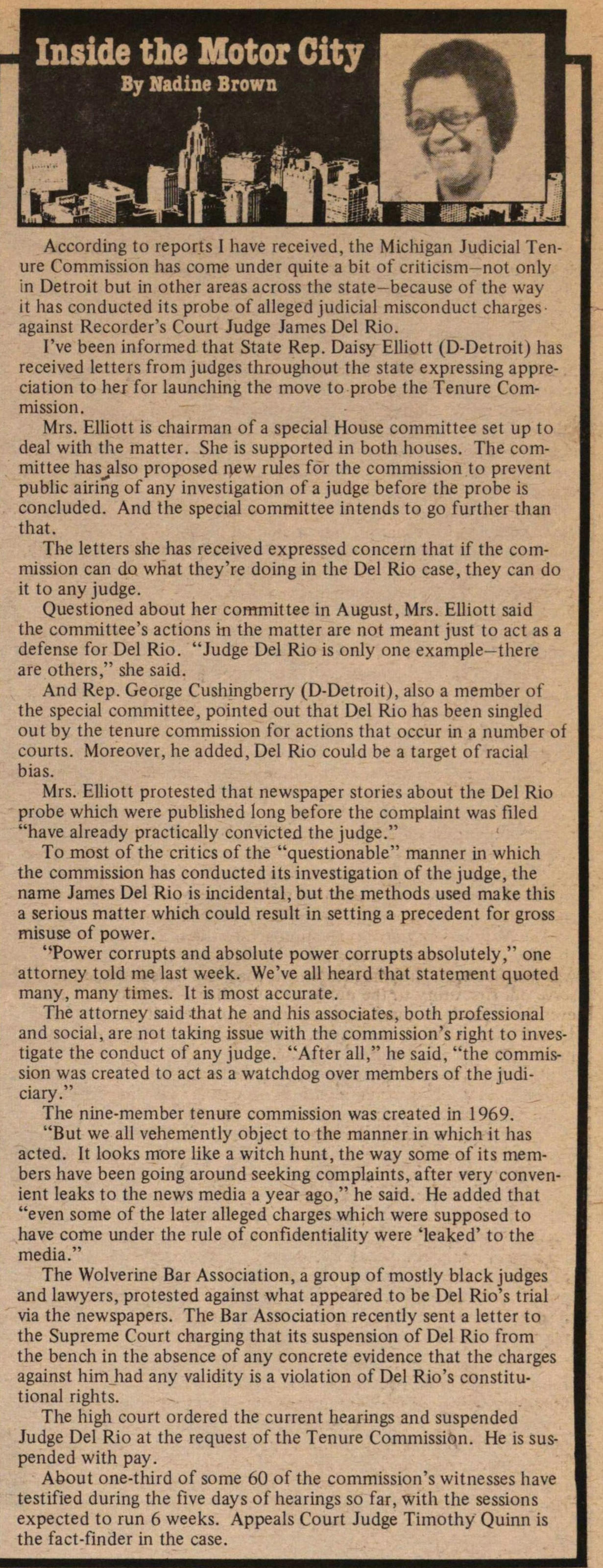Inside The Motor City

According to reports I have received, the Michigan Judicial Tenure Commission has come under quite a bit of criticism- not only in Detroit but in other areas across the state- because of the way it has conducted its probe of alleged judicial misconduct charges against Recorder's Court Judge James Del Rio.
I've been informed that State Rep. Daisy Elliott (D-Detroit) has received letters from judges throughout the state expressing appreciation to her for launching the move to probe the Tenure Commission.
Mrs. Elliott is chairman of a special House committee set up to deal with the matter. She is supported in both houses. The committee has also proposed new rules for the commission to prevent public airing of any investigation of a judge before the probe is concluded. And the special committee intends to go further than that.
The letters she has received expressed concern that if the commission can do what they're doing in the Del Rio case, they can do it to any judge.
Questioned about her committee in August, Mrs. Elliott said the committee's actions in the matter are not meant just to act as a defense for Del Rio. "Judge Del Rio is only one example-there are others," she said.
And Rep. George Cushingberry (D-Detroit), also a member of the special committee, pointed out that Del Rio has been singled out by the tenure commission for actions that occur in a number of courts. Moreover, he added, Del Rio could be a target of racial bias.
Mrs. Elliott protested that newspaper stories about the Del Rio probe which were published long before the complaint was filed "have already practically convicted the judge."
To most of the critics of the "questionable" manner in which the commission has conducted its investigation of the judge, the name James Del Rio is incidental, but the methods used make this a serious matter which could result in setting a precedent for gross misuse of power.
"Power corrupts and absolute power corrupts absolutely," one attorney told me last week. We've all heard that statement quoted many, many times. It is most accurate.
The attorney said that he and his associates, both professional and social, are not taking issue with the commission's right to investigate the conduct of any judge. "After all," he said, "the commission was created to act as a watchdog over members of the judiciary."
The nine-member tenure commission was created in 1969. "But we all vehemently object to the manner in which it has acted. It looks more like a witch hunt, the way some of its members have been going around seeking complaints, after very convenient leaks to the news media a year ago," he said. He added that "even some of the later alleged charges which were supposed to have come under the rule of confidentiality were 'leaked' to the media."
The Wolverine Bar Association, a group of mostly black judges and lawyers, protested against what appeared to be Del Rio's trial via the newspapers. The Bar Association recently sent a letter to the Supreme Court charging that its suspension of Del Rio from the bench in the absence of any concrete evidence that the charges against him had any validity is a violation of Del Rio's constitutional rights.
The high court ordered the current hearings and suspended Judge Del Rio at the request of the Tenure Commission. He is suspended with pay.
About one-third of some 60 of the commission's witnesses have testified during the five days of hearings so far, with the sessions expected to run 6 weeks. Appeals Court Judge Timothy Quinn is the fact-finder in the case.
Article
Subjects
Freeing John Sinclair
Old News
Ann Arbor Sun